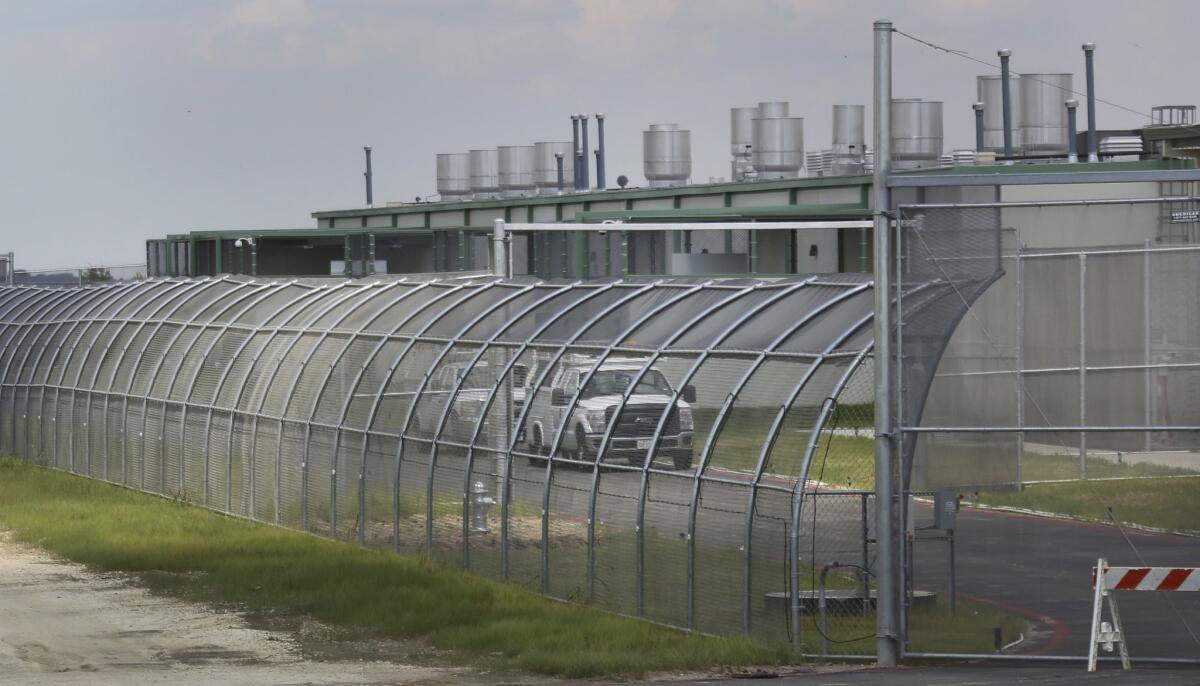Editorial: Immigration detainees shouldn’t be coerced into $1-a-day jobs

People facing deportation proceedings, as well as those who arrive at the border seeking asylum from persecution in their home countries, often wind up in federal detention centers. In fact, on any given day some 44,000 such people are detained in the U.S., two-thirds of them in facilities owned and operated by private prison companies. There, the detainees get the chance to “volunteer” to work — at appallingly low rates of $1 or $1.50 a day — as cooks, dishwashers, food servers, janitors, groundskeepers, barbers, and even clerks helping to process new arrivals.
The private prison companies argue in court papers that the federal government authorizes them to run those voluntary work programs, and no one is compelled to take part. But according to a number of federal lawsuits by current and former detainees challenging the practice, the notion that the detainees have a choice is illusory. Given the imbalance of power between jailers and the jailed, detainees say they don’t feel they can refuse to work, and many report they have been coerced through threats of withheld privileges, such as family visits, and in some cases that they have been sent off to solitary confinement if they declined. That is atrocious.
Cheaper and more flexible is no excuse for abusing the fundamental rights of people being held against their will as the government seeks to deport them.
Prison labor is not a new concept for the country. The 13th Amendment, ratified seven months after the end of the Civil War, abolished slavery but allowed “involuntary servitude … as a punishment for crime whereof the party shall have been duly convicted.” Courts have held that prisoners and detainees can be compelled to keep their immediate housing area clean, and people sentenced for crimes can be compelled to work for the congressionally set minimum of $1 a day because the work is considered part of their punishment and rehabilitation.
We’ll leave unexplored here whether prison labor is inherently inhumane (defenders see it as part of the rehabilitation process and a way to break the tedium of prison life) to focus on the key difference between prisons and immigration detention. Prison inmates are serving time because they have been convicted of a crime. But immigration detainees are being held pending civil proceedings to determine whether they will be deported, not as a punishment after a conviction. In fact, unless they were deemed a flight risk or a threat to public safety, people going through deportation proceedings shouldn’t have been jailed in the first place.
It is unconscionable that the government and its contractors abuse them further by effectively compelling them to work. It’s even more outrageous that they receive as little as $1 a day for doing jobs central to operating the detention centers and caring for the detainees. Ironically, many detainees do not have green cards and can’t legally work in the U.S., a technicality avoided by calling the $1-a-day wage an allowance, as though the workers were children rewarded for doing chores. Some of the lawsuits seek back pay for unpaid work, which seems a fair demand. We also hope courts see this practice for what it is — in essence, forced labor — and order the detainees be paid at least the local minimum wage, and ensure that taking a job truly is a matter of choice.
President Obama took steps to break the government’s reliance on private prisons, both for the federal prison system and the immigration detention system, but President Trump reversed those moves. (Not coincidentally, stock prices for the two leading private prison companies have doubled since the inauguration.) Trump has also sought to expand the immigration detention system despite persistent reports by human rights and immigrant advocacy groups, sometimes confirmed by government audits, of mistreated detainees and poorly maintained facilities.
Proponents of privatization say relying on private contractors is cheaper and gives the government more flexibility because it can then grow or shrink the system’s capacity through contracts instead of building facilities that it must then maintain. But cheaper and more flexible is no excuse for abusing the fundamental rights of people being held against their will as the government seeks to deport them. Letting private operators pad their profit margins by conscripting the detainees into all-but-unpaid labor must end. It’s astounding that this ersatz slavery system was allowed to take root in the first place.
Follow the Opinion section on Twitter @latimesopinion or Facebook
More to Read
A cure for the common opinion
Get thought-provoking perspectives with our weekly newsletter.
You may occasionally receive promotional content from the Los Angeles Times.






